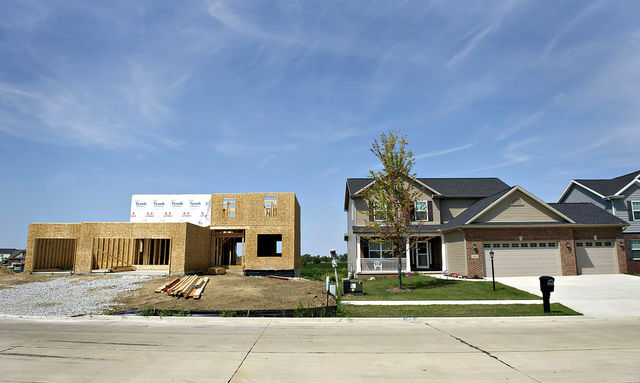
By Clea Benson on September 19, 2012
Jerry Howard, chief executive officer of the National Association of Homebuilders, says he wants to know when President Barack Obama and Republican challenger Mitt Romney are going to outline plans for reviving the U.S. residential property market.
He’s not the only one. So far, discussions about housing by Obama and Romney on the campaign trail have been limited and vague, which makes the two politicians sound like they support most of the same ideas.
One reason for the relative silence: There are few solutions with wide appeal.
“The lack of talking about housing policy is not because it’s not important,” said Mark Calabria, director of financial regulation studies at the Cato Institute, which promotes free- market policies. “It’s because there’s not an easy answer.”
While the housing market is showing signs of recovery, the improvement is still meager compared to the damage. New home sales are still 50 percent below the average rate over the past 40 years. Almost 11 million families are “underwater” — saddled with more debt than their homes are worth after five years of declining home prices.
After nearly four years in the White House, Obama is facing criticism that his relief programs for borrowers have lacked broad and aggressive measures and have reached fewer families than intended.
Blueprint Delayed
Moreover, some promised initiatives remain undone. The president has yet to unveil a blueprint for overhauling the nation’s housing finance system and winding down Fannie Mae (FNMA) and Freddie Mac (FMCC), the taxpayer-owned companies that back about 60 percent of the U.S. home loan market and have been supported with $190 billion of capital injections. New regulations governing mortgage securitization that were mandated by the Dodd-Frank Act in 2010 have yet to be written.
On the campaign trail, Obama’s discussion of housing focuses primarily on helping distressed homeowners refinance into historically low interest rates. That’s a position that doesn’t alienate voters who resent government aid going to delinquent borrowers, since most people who qualify for refinancing programs must be current on their mortgages.
“The issue is so divisive, because everybody feels you need to do something about the housing market,” Calabria said. “But there’s still a lot of the feeling of, ‘I don’t want to bail out my neighbor who isn’t paying his mortgage’.”
Refi Expansion
On a visit to Nevada last week, where 60 percent of homeowners are underwater, Obama urged Congress to vote on a Senate bill that would expand a government program that helps such borrowers cut their interest payments.
Activist groups typically aligned with Democrats say that’s not enough. They want more details on the president’s future plans for foreclosure prevention, neighborhood aid, and overhauling the housing-finance system.
“Assuming there’s not a radical shift in the alignment of Congress, what’s President Obama going to do differently in his second term to achieve his goals?” said Alan Jenkins, executive director of the Opportunity Agenda, an organization that promotes economic opportunity.
Brian Deese, deputy director of the National Economic Council at the White House, said Obama has been talking about a broad set of housing initiatives in recent public appearances, including a proposal to spend $15 billion on redevelopment of neighborhoods devastated by the housing crisis.
“He has a proposal on the table, and if Congress will work with us to make some progress on it, it would make a material difference for those communities,” Deese said.
Few Details
For his part, Romney has provided few details on how he would approach the housing market and foreclosures differently than Obama.
He has shifted his position on whether the government should intervene to stop foreclosures. He told a Las Vegas newspaper last year that the housing market should be left to hit bottom on its own. Then, in January, Romney told Florida voters that a “more concerted effort” was needed, saying “the idea that somehow this is going to cure itself by itself is probably not real.”
Romney was overheard at a fundraiser in April saying he might abolish the Department of Housing and Urban Development, the department that his father, George Romney, headed during the administration of President Richard Nixon.
It wasn’t until earlier this month that the Republican nominee posted a four-point plan on housing on his campaign website.
